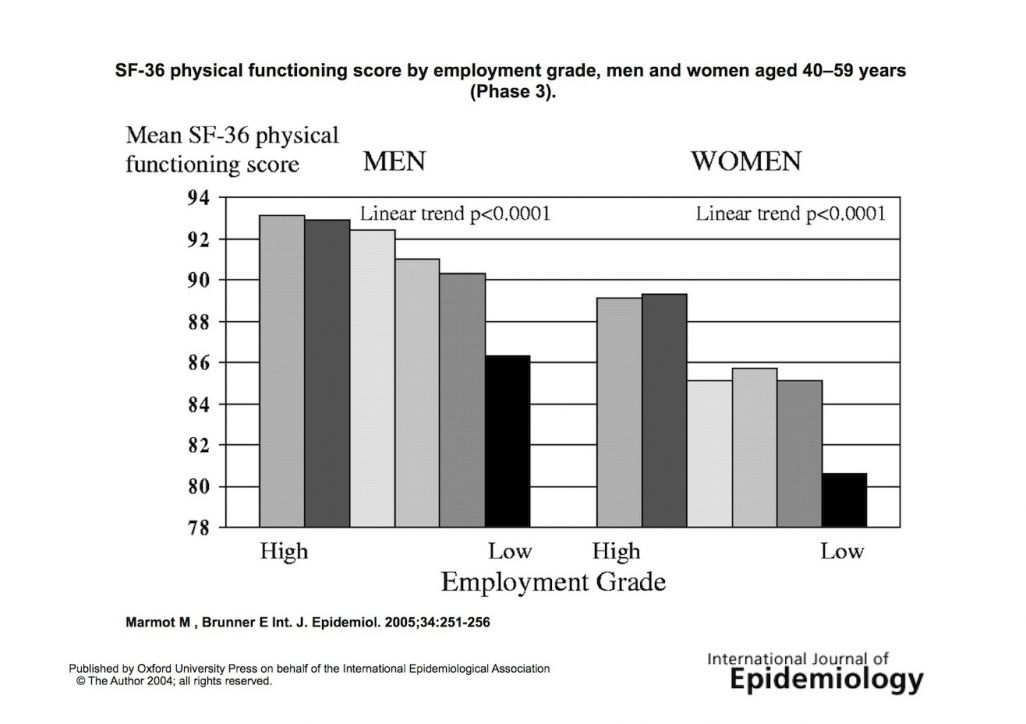Marmot et al (1997)
 Marmot et al (1997) - also known as the "Whitehall Study" - is perhaps one of the most well-known studies in health psychology. This study may be used to discuss the following learning objectives:
Marmot et al (1997) - also known as the "Whitehall Study" - is perhaps one of the most well-known studies in health psychology. This study may be used to discuss the following learning objectives:
Effect of sociocultural factors on health
Explanations of health problems
Research approaches in health psychology
The goal of the Whitehall study was to determine how workers' control over their work environment affects their health. The researchers hypothesized that high levels of control lead to lower levels of stress, while low levels of control – typically experienced by workers lower down the organization hierarchy – can increase stress levels. In other words, the further down the bureaucratic hierarchy you are, the higher the risk of stress-related health effects.
Marmot et al. (1997) analyzed data from over 7000 British civil servants. The sample was made up of men and women, aged 35 - 55, working in the London offices of 20 different Whitehall departments. Participants were given an initial screening to make sure that all were free of heart problems prior to the study. The aim was to find out whether employees in the lower position jobs - that is, with less control over their work environment - would develop heart problems over a five year period. This is an example of a prospective longitudinal study. Although it still is correlational, it establishes that, in fact, heart disease developed over the course of the study, eliminating pre-conditions as a confounding variable.
In order to gather their data, the researchers used a series of questionnaires, as well as carried out health screenings. The participants were invited to the research clinic and a questionnaire was sent to their homes at yearly intervals. Self-reported non-fatal heart problems, as well as cases of cancer and diabetes, were verified by hospital records.
The data showed a correlation between heart disease and one's control in the workplace. The rate of heart problems in the lowest levels of the system were 1.5 times the rate in the highest levels.
When the researchers analyzed the data they found that risk factors such as smoking, obesity and hypertension could account for some of the differences, but the most significant factor was the degree of control that participants felt they had. Lack of control had a significant effect when matched for other risk factors. The graph below shows the “physical functioning score” of men and women in relation to their level within the bureaucracy.

It appears that there is a relationship between one’s sense of control in the work environment and the health of one's cardiovascular system. The study has been supported by animal research. Robert Sapolsky found that dominant male baboons had lower levels of stress hormones than subordinate baboons. Sapolsky observed that the dominant males often teased the weaker ones, pushing them around and not letting them have a fair share of food or mating privileges. In fact, the baboons that were most submissive to the dominant males revealed brain activity similar to the kind found in clinically depressed humans.
The fact that this is a longitudinal prospective study is a key strength of the research. Also, since everyone in Britain receives the same quality healthcare, the level of health care cannot be considered a confounding variable to the extent that it would be in the United States.
However, there are some limitations to the study. The study was based primarily on self-report questionnaires. Social desirability effect could play a role in individual responses regarding risk factors. In addition, not all participants may have been conscious of - or honest about - their health over the five year period. Although hospital records were also used, access to these records was not always available to the researchers.
In addition, the sample was taken from the British government’s civil servants. The hierarchy is perhaps more rigid in the Civil Service than in other large employers. This is simultaneously a strength and a weakness of the Whitehall study. The study may not be representative of conditions experienced in the average workplace.
Finally, the researchers may have overly attributed the effects on health to the hierarchy, rather than to dispositional factors. Although control within the system may be the root of stress-related illness, one has to question whether there is a disposition toward a sense of control. The research does not account for differences within each level of the system, only between them.

 IB Docs (2) Team
IB Docs (2) Team
